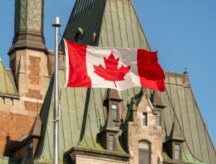Canada-U.S. border closed another month, experts meet to discuss re-opening
Leading border experts met to discuss how to re-open the Canada-U.S. border, as Canada announces travel restrictions will roll over until April 21.
Prime Minister Justin Trudeau made the announcement on Twitter, saying non-essential travel between Canada and the U.S. will continue for another 30 days.
Update on our border: Non-essential travel restrictions between Canada and the US have been extended by another 30 days - until April 21st. We’ll continue to do whatever is necessary to keep you and your loved ones safe.
— Justin Trudeau (@JustinTrudeau) March 18, 2021
Trudeau, had previously told reporters cross-border travel will resume "eventually but not for today."
Meanwhile, experts discussed issues around the border closure with the Wilson Task Force, a non-partisan group charged with studying how to re-open the Canada-U.S. border. Task Force members include former politicians, Jean Charest and Anne McLellan from Canada, as well as Christine Gregoire and James Douglas from the U.S.
Panelists presented their initial findings of how travel restrictions have affected border communities over the past year. The meeting was broadcast on the Wilson Center's webpage on March 18.
Get help with Canadian work permits
Experts call for scientific approach supported by public opinion
The consensus among panelists was that the border's re-opening had to be guided by science-based evidence driven by data. However, there are not many groups that focus specifically on collecting this required data.
"Very few [organizations] focus on the border and that’s a problem," Kathryn Friedman from the University at Buffalo said. "Without the research, data, and great minds, border policy will be ad hoc and reactive."
Experts also cautioned that this would not be the last time the Canada-U.S. border would have to close in some capacity. They floated the idea of establishing a bilateral commission that would involve the private sector and meet regularly to focus on border issues.
"Just like we had a 9/11 commission we should have a Canada-U.S. commission that could go on both sides of the border and see what can we do together to achieve the greatness of our people," said Matt Morrison, CEO of Pacific NorthWest Economic Region.
The other challenge would be finding a border re-opening solution that would be accepted by public opinion. A recent Angus Reid Institute poll suggests most Canadians want the border to stay closed to non-essential travel. Furthermore, new policies will have to address privacy concerns if border officials start asking travellers for more personal data. Bill Anderson from the University of Windsor recommended that broad public relations efforts should be implemented to clarify border-crossing requirements, and manage fear.
The Task Force is expected to release their findings and recommendations in April, a spokesperson from the Wilson Center told CIC News.
Get help with Canadian work permits
© CIC News All Rights Reserved. Visit CanadaVisa.com to discover your Canadian immigration options.
- Do you need Canadian immigration assistance? Contact the Contact Cohen Immigration Law firm by completing our form
- Send us your feedback or your non-legal assistance questions by emailing us at media@canadavisa.com







